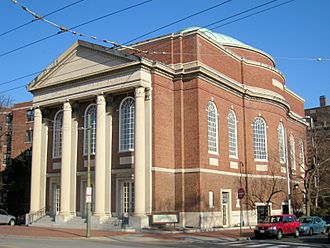First Church of Christ, Scientist (Cambridge, Massachusetts) facts for kids
Quick facts for kids First Church of Christ, Scientist
13 Waterhouse Street |
|---|

15 March 2009
|
|
| General information | |
|---|---|
| Architectural style | Classical Revival |
| Town or city | 13 Waterhouse Street Cambridge, Massachusetts |
| Country | United States |
| Construction started | 1924 |
| Completed | 1930 |
| Technical details | |
| Structural system | 6 story (including basement) redbrick with copper clad dome |
| Design and construction | |
| Architect | Giles M. Smith of Bigelow and Wadsworth, later Bigelow, Wadsworth, Hubbard and Smith |
| Engineer | Guastavino Fireproof Construction Company, dome |
The First Church of Christ, Scientist is a historic church building located at 13 Waterhouse Street in Cambridge, Massachusetts. It is a large, 6-story building made of red brick with a unique dome on top. This church is an active part of the Christian Science faith.
Contents
Building Design and Inspiration
The church was designed in 1917 by Giles M. Smith. He was a member of the church and worked for a famous architectural company in Boston. Smith designed the building to look like two very old and important structures.
Ancient Roman Influence
One of the inspirations for the church's design was the Pantheon in Rome. The Pantheon is an ancient Roman temple known for its impressive dome. The Cambridge church shares a similar grand, circular style.
American University Connection
The other main inspiration was The Rotunda at the University of Virginia. This building was designed by Thomas Jefferson, one of America's founding fathers. It also features a large, round shape and a dome.
Construction Details
Building such a large and detailed church took time and effort. It was built in two main stages because of the costs involved.
Building in Phases
Construction began in 1924. The first part to be built was the basement and the ground floor. These levels were finished and then topped with a decorative stone band called a belt course. This marked the end of the first phase.
Adding the Dome
The second and final phase of construction started later. This included adding the remaining four stories and the huge dome. The dome itself was a special project.
The Guastavino Dome
The dome was designed and built by the famous Guastavino Fireproof Construction Company. This company was known for its unique tile arch system. They had also worked on the dome of The Rotunda at the University of Virginia in 1898. In 1906, they built the dome for the Mother Church Extension in Boston.
The Guastavino company used a special porous ceramic material called Akoustolith for the inside of the dome. This material looked like stone. The outside of the dome was made of limestone. The special tiles were made at their factory in nearby Woburn.
Dome Features
In 1933, a layer of copper was added to the outside of the dome. This was done to fix a problem with water leaking. A round opening at the very top of the dome, called an oculus, allowed natural light to shine into the building.
Church History
The First Church of Christ, Scientist, has a rich history in its Cambridge location.
First Services and Dedication
The first church services in the completed building were held on April 30, 1930. After the church paid off all its building costs, it was officially dedicated on May 23, 1937. This dedication marked a special milestone for the congregation.
Continuing Legacy
Today, the First Church of Christ, Scientist, continues to be an active church. It serves as a branch of the larger Christian Science Mother Church.

